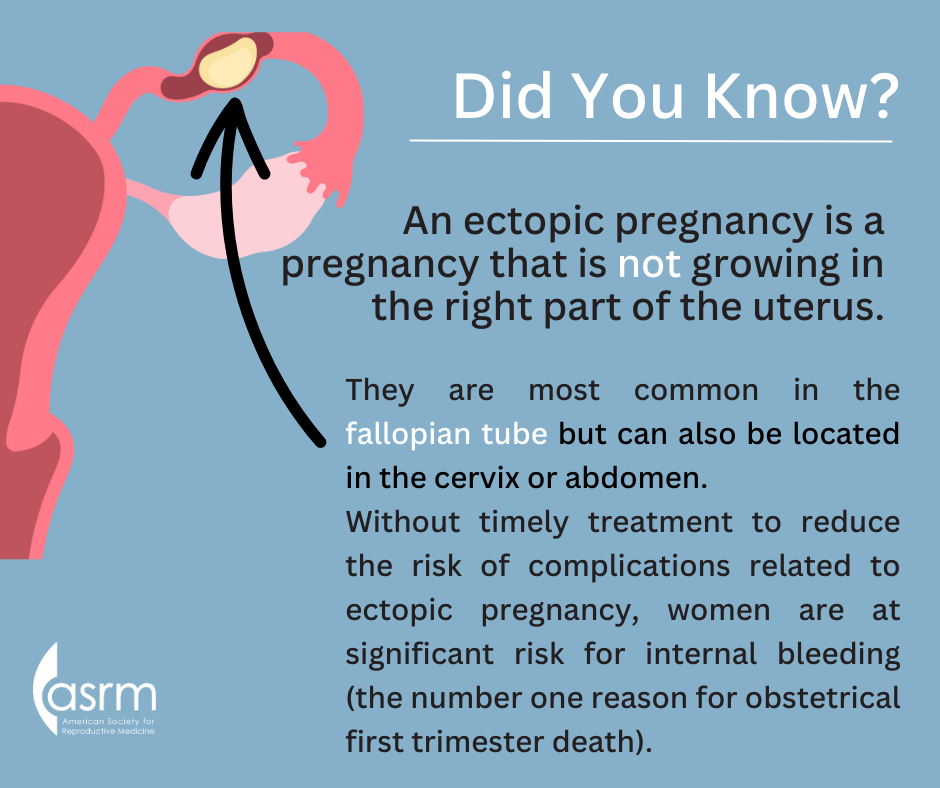
Ectopic pregnancy
Developed in collaboration with the Society for Reproductive Surgeons
Created 2014/ Revised 2023
What is ectopic pregnancy?
An ectopic pregnancy is any pregnancy that grows outside of the uterus (womb). In a normal pregnancy, the egg meets the sperm (is fertilized) in the fallopian tube and the embryo (fertilized egg) travels through the tube to the uterus. Once there, the embryo implants (attaches) and grows into a baby. When an embryo starts attaching and begins to grow anywhere outside the uterus, it is called an ectopic pregnancy.
The most common place for an ectopic pregnancy is in a fallopian tube. It is also possible, but rarer, to find an ectopic pregnancy in the ovary, cervix, or somewhere else in the abdomen.

It can be very dangerous or even life-threatening if an ectopic pregnancy is not treated properly.
What causes an ectopic pregnancy?
Many women who have ectopic pregnancies have no obvious risk factors. However, a woman might be more likely to have an ectopic pregnancy if she:
- had surgery in the pelvis or abdomen (belly)
- had a sexually transmitted infection
- has endometriosis, a condition where the tissue that lines your uterus grows in other places
- smokes cigarettes
- had fertility treatment in the past
- had a previous ectopic pregnancy
- became pregnant with an intrauterine device (IUD) in place
 How do doctors diagnose ectopic pregnancies?
How do doctors diagnose ectopic pregnancies?
A combination of blood tests and ultrasound scans can help your doctor diagnose an ectopic pregnancy. A blood pregnancy test measures how much of the pregnancy hormone (human chorionic gonadotropin or hCG) is in the blood. This “hCG level” usually is measured more than once to see if the level is rising normally. Ultrasounds of the lower abdomen show whether the pregnancy is inside or outside the uterus. If a woman has any of the risk factors for an ectopic pregnancy, it is important for her to be evaluated as soon as she knows she is pregnant.
How do doctors treat ectopic pregnancies?
An ectopic pregnancy can be treated in 4 ways, depending on a woman’s symptoms and how far into the pregnancy she is.
Methotrexate
Methotrexate is a medicine that stops an ectopic pregnancy from continuing to develop. A healthcare professional gives this medicine by injection. A woman should avoid alcohol, folic acid, and medicines like ibuprofen to make sure the medicine works correctly. Side effects can include nausea, vomiting, diarrhea, abdominal pain, and mouth sores. If a woman has severe abdominal pain or fainting after treatment, she should immediately call her doctor for re-evaluation. The doctor will repeat hCG levels every few days to make sure that the ectopic pregnancy is responding to treatment. The ectopic pregnancy has ended when the hCG level drops to zero. Almost 90% of ectopic pregnancies can be successfully treated with methotrexate if detected early enough. The rest will require surgery to treat.
Laparoscopy
Laparoscopy is the most common surgery for ectopic pregnancies. It is called a minimally invasive surgery because the doctor makes very small incisions in your lower abdomen. A small telescope attached to a camera is placed into one incision so that the doctor can look for the ectopic pregnancy. Small instruments are inserted through other small incisions to remove the ectopic pregnancy. If a fallopian tube is damaged, the doctor may have to remove the tube as well.
Laparotomy
In some cases, an ectopic pregnancy causes a large amount of internal bleeding or there is too much scar tissue to be able to remove the ectopic pregnancy using laparoscopy. In these cases, a larger abdominal incision called a laparotomy is used to remove the ectopic pregnancy.
Careful Observation
In some cases, a very early ectopic pregnancy will go away without treatment, often before it is even confirmed or diagnosed. If you are at risk for an ectopic pregnancy, you should consult a health care provider as soon as you think you may be pregnant.
 Will I have complications?
Will I have complications?
Even with appropriate treatment and observation, an ectopic pregnancy might cause life-threatening internal bleeding. You should go to your doctor or hospital if you have pelvic, abdominal, or shoulder pain or fainting, since any of these can be symptoms of internal bleeding. If a fallopian tube ruptures, emergency surgery is needed.
Will I be able to get pregnant after an ectopic pregnancy?
Women with a history of an ectopic pregnancy are encouraged to plan a future pregnancy and should consider seeking fertility specialist care early in the process of planning. It is sometimes hard to get pregnant after having an ectopic pregnancy. This may be due to problems in the fallopian tubes or scarring in the pelvis that led to the first ectopic pregnancy.
If a woman is able to get pregnant after an ectopic pregnancy, there is at least a 10% chance of having another ectopic pregnancy.
Early evaluation of later pregnancies by a health care professional is important. If a woman has difficulty getting pregnant after having an ectopic pregnancy, fertility testing and treatment can improve her chances.
Ectopic Pregnancy
Fact Sheets/Booklets
View more fact sheets and booklets written by the ASRM Patient Education Committee.
Menopausal Transition (Perimenopause): What Is It?
The menopausal transition (perimenopause) is the period that links a woman’s reproductive (childbearing) years and menopause.
Osteoporosis
Osteoporosis and osteopenia are conditions of having low bone mass (density).
Hyperprolactinemia (High Prolactin Levels)
Prolactin is a hormone produced by your pituitary gland which sits at the bottom of the brain.Find a Health Professional











